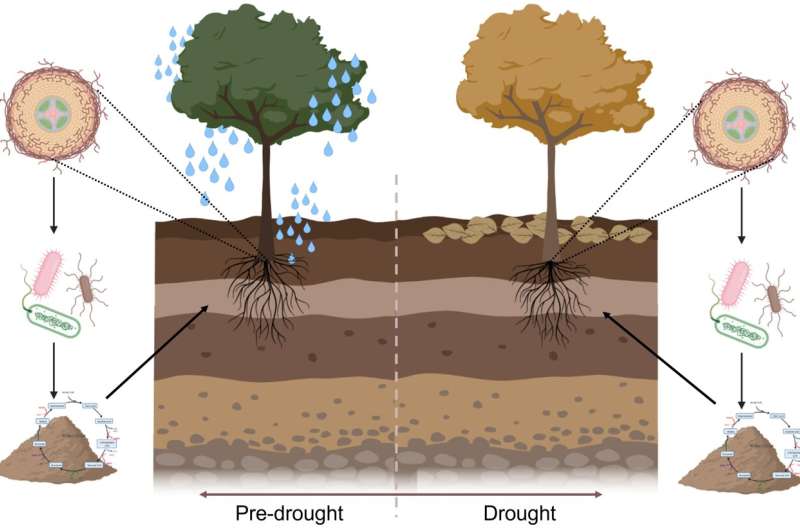This article has been reviewed according to Science X's editorial process and policies. Editors have highlighted the following attributes while ensuring the content's credibility:
fact-checked
trusted source
proofread
Tropical plants beat drought by interacting with specific microbes, study shows

Plant-soil-microbe interactions play a crucial role in processes that take place in the soil directly around plant roots, or the rhizosphere, and these processes contribute to nutrient cycling and metabolite turnover in the environment. Amid the water scarcity that occurs with climate change, plants are forced to adapt through a range of processes that impact soil organic matter turnover in the rhizosphere.
To further understand how these plant processes influence soil organic matter turnover, a multi-institutional team of researchers examined how three tropical plants, specifically Piper auritum, Hibiscus rosa sinensis, and Clitoria fairchildiana, interact with the microbes in the rhizosphere during drought.
The team used advanced analytical techniques to see how these interactions affect the breakdown of organic matter in the soil. Surprisingly, they found that the response of plant roots to drought, rather than to changes in the microbial community, predominantly shapes the chemistry in the soil.
For the first time, this team of researchers showed that even during drought, plants can maintain specific microbe partnerships, revealing a new level of resilience. The study is unique in highlighting how tropical plants and their associated bacterial communities within the rhizosphere respond to drought conditions.
This knowledge opens the door for using the plant-associated microbes to enable those plants to better handle drought conditions. It also provides greater understanding and preparation strategies for the drought-related impacts of climate change on plant health. The work is published in the journal Science of The Total Environment.
This study examined how different tropical plant species and their associated microbial communities influence soil organic carbon turnover in the rhizosphere, especially under drought conditions. The research utilized advanced techniques including 16S rRNA sequencing at the University of Arizona, rhizosphere metabolomics, and position-specific 13C-pyruvate labeling at EMSL using the 12T Fourier transform ion cyclotron resonance mass spectrometer and liquid state nuclear magnetic resonance to analyze plant-microbe interactions.
The team found that the metabolome of the rhizosphere was primarily shaped by the response of each plant species to drought rather than direct changes in the bacterial community composition. Specifically, reduced root exudation by Piper auritum under drought led to less reliance on neighboring microbes to shape the rhizosphere metabolome.
In contrast, Hibiscus rosa sinensis and Clitoria fairchildiana experienced altered exudate composition during drought, driving changes in the rhizosphere bacterial communities, which collectively impacted the metabolome. Furthermore, excluding certain microbes from the rhizosphere caused metabolome shifts. Clitoria fairchildiana is associated with only a subset of symbiotic bacteria during drought.
Overall, as roots respond to drought, their microbial communities adapt, potentially reinforcing the drought tolerance of the plant. These species-specific plant-microbe interactions systematically change with the root metabolome under drought conditions. The findings have important implications for maintaining plant health during drought stress and improving plant performance under climate change.
More information: Gina A. Hildebrand et al, Uncovering the dominant role of root metabolism in shaping rhizosphere metabolome under drought in tropical rainforest plants, Science of The Total Environment (2023). DOI: 10.1016/j.scitotenv.2023.165689
Provided by Environmental Molecular Sciences Laboratory





















